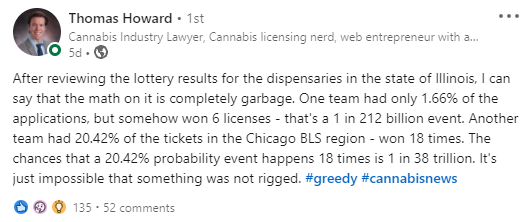Lotteries in general are a problematic tool to deal with scarce goods, as shown in categories from housing to visas. With cannabis, the government both creates and regulates the scarcity in real time.
I was born in Rogers Park, Chicago. When I abandoned college (one of the times), I moved back to work in a Greek and Albanian restaurant and live with my grandparents. I used to enjoy sitting at the breakfast table with them and reading the Tribune, which often carried stories of city and downstate corruption. My grandfather told stories of local aldermen spending $1mm to win $70k jobs (still happening), and recounted the sagas of the state’s jailed governors (there were four in his time). This kind of stuff is endemic to Illinois, the most corrupt state in the nation by evidence and acclamation. It’s Chinatown. Now, you wonder, was the Illinois cannabis lottery rigged. There is big money at stake.
Because these stories of graft and malfeasance are personally interesting to me, and because I’m a cannabis business lawyer, I thoroughly enjoyed this gem of a post last week by Thomas Howard, Esq., on LinkedIn:

Do I trust Mr. Howard’s research, and his math? I want to — he’s a lawyer and “licensing nerd” after all. Of course, nothing I wrote above about Illinois would be admissible as evidence of a lottery fix if we were in court; and neither would anything Mr. Howard wrote (although he is closer). You have to prove it. But the lottery has been rife with problems already, explained away as “clerical oversights” and leading to at least six filed lawsuits. If Mr. Howard’s data are correct, we should see more of them soon on theories spanning from civil rights to administrative process. In the meantime, here are a few takeaways.
Cannabis License Lotteries Are a Bad Idea
Cannabis license lotteries invariably lead to litigation, as a quick Google search will show going back at least as far as 2014 in states like Washington and Massachusetts. Lotteries in general are a problematic tool to deal with scarce goods, as shown in categories from housing to visas. With cannabis, the government both creates and regulates the scarcity in real time, so it’s probably more analogous to visas than housing. Said another way: with cannabis, public policy doesn’t meld with market factors over a long period to create a limited class of goods. The government just says, “we are only going to issue X amount of cannabis licenses, and you all get to fight for them.”

When a jurisdiction decides to create a limited pool of cannabis licenses, one of three approaches to licensing is typically pursued. These include: 1) competitive licensing (which can also be controversial— we’ve filed these lawsuits); 2) “first to file an application” (always a disaster— e.g. L.A. in 2019; Oregon in 2014); or 3) the lottery. Of these three, competitive licensing and lotteries are attractive to policymakers in that the systems can be designed to favor certain classes of applicants— which is what Illinois was ostensibly trying to do with social equity applicants.
RELATED: Illinois Hits $109M In Marijuana Sales In March, Marking New Record
In my view, though, the best approach is NOT to cap license numbers artificially. There are better ways to help social equity applicants and marginalized communities, starting with priority application processing and extending through grants, reduced or waived fees, reinvestment of tax revenues in disproportionately affected areas, automatic expungement, etc. In all other respects, states should treat cannabis businesses like other state-licensed businesses, with zoning laws and local control factors allowed to shape the market. Could you end up like Oklahoma? Sure. But things will even out. The market and not the state should be picking winners here.
Public Records and Transparency Are Essential
We have been writing recently about public records in the cannabis context, spurred by some frustrating experiences here in Oregon. Public records law is crucial in the context of cannabis licensing. Presumably, Mr. Howard extrapolated his data from a review of public records, a valuable tool for auditing government, gathering market information, or even defending cannabis businesses in administrative proceedings.
RELATED: Cannabis Licensee Residency Requirements (Which Are Dumb) Are Probably Unconstitutional
Some government records, including meetings, are published and available without much effort on the part of the public. Other records take some digging. You may even have to pay a nominal fee to the government body for their time and effort in fulfilling the request; but most information is up for grabs. With the Illinois cannabis lottery, it seems you can find information on the process and program here. But that is not the end of the story. You can bet the state is awash in public records requests related to its cannabis lottery and will be for a while.
“A Couple of Politicians Getting Together in Chicago is a Crime Scene Now”
A federal prosecutor named Jeff Cramer gave us that wonderful quip. Chicago — and Illinois — have always been famously corrupt. But was the lottery rigged? Maybe so! More likely, though, most of these licenses were granted legitimately, and some inappropriately. If that were the case, the scheme would still be consistent with a grand Illinois tradition going back generations— politicians using a state apparatus for personal benefit. Why should cannabis be any different?
Vince Sliwoski is an attorney at Harris Bricken, a law firm with lawyers in Seattle, Portland, Los Angeles, San Francisco, Barcelona, and Beijing. This story was originally published on the Canna Law Blog and has been reposted with permission.


